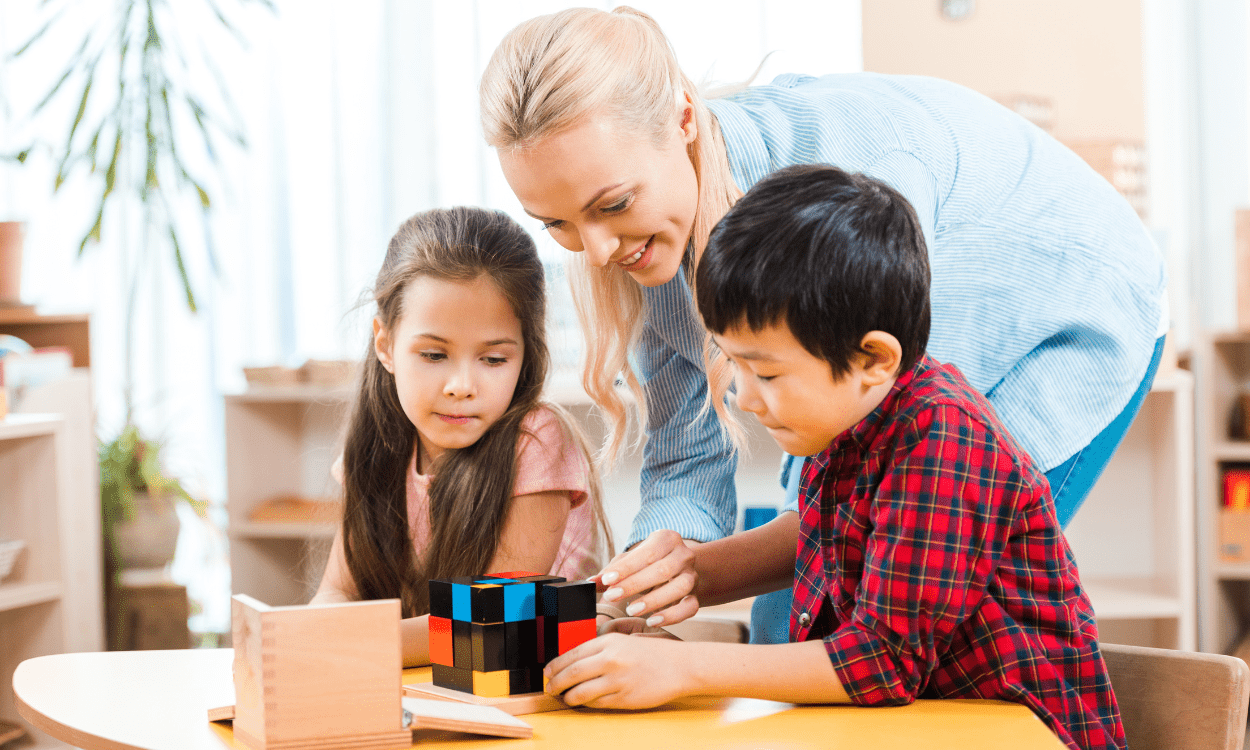As a parent, you want your child to develop a lifelong love of learning, and Montessori education offers a unique approach to nurturing that curiosity—especially in the Primary years (ages 3-6). Science plays a key role in this developmental stage, helping children explore and understand the world around them through hands-on experiences and sensory exploration. In Montessori classrooms, science isn’t about memorizing facts—it’s about discovery, exploration, and asking questions, all in a way that feels natural and engaging for young children.
The Montessori Approach to Science in the Primary-Age Years
In Montessori, children are seen as active participants in their learning journey. Instead of sitting in front of a teacher and listening to lectures, kids are encouraged to engage directly with their environment. Teachers act more as guides, providing materials and activities that spark curiosity, rather than instructing from the front of the room. This approach to science is centered on the idea that children learn best by doing. Through touching, seeing, hearing, and even tasting, children make sense of the world in a way that feels intuitive and fun.
Montessori science for children ages 3-6 revolves around a few key principles that help support independent learning and deeper understanding:
- Sensory Exploration: Young children learn best when they can engage their senses—touching, smelling, hearing, seeing, and sometimes tasting—what they’re learning about.
- Concrete to Abstract: Kids begin with concrete, hands-on materials to explore scientific ideas. As they grow and their thinking matures, they’re able to move on to more abstract concepts.
- Independent Discovery: Montessori encourages children to explore and discover things on their own. This builds their problem-solving skills, fosters independence, and helps them develop a natural sense of curiosity.
Key Areas of Montessori Science for Ages 3-6
Montessori science for the primary years covers a wide range of topics, from the basics of the natural world to more fundamental ideas in physics. These concepts are introduced through interactive activities that are both fun and educational, giving children real-world connections to what they’re learning.
- Living vs. Non-Living
One of the first scientific distinctions children make in Montessori is between living and non-living things. Children in a Montessori class will interact with plants, observe animals, or even conduct simple experiments to deepen their understanding of life itself. - Plant and Animal Life Cycles
Young children are naturally curious about the cycles of life. In Montessori classrooms, kids might plant seeds, watch them grow, and chart their progress. They could also study the life cycle of a butterfly, observing how it transforms from caterpillar to butterfly. These hands-on activities not only teach about growth but also foster a deeper respect and understanding of the natural world. - The Five Senses
Science in the early years is all about developing awareness through the senses. Montessori classrooms often feature activities like “sound cylinders,” where children match different sounds, or “scent bottles” that let them explore different smells. These types of activities help kids connect to the world in a very sensory way and build a rich vocabulary for describing what they experience. - Basic Physics and Simple Machines
While abstract concepts like force or motion might seem advanced, Montessori makes them accessible through simple tools and experiments. Children can experiment with ramps, pulleys, levers, and wheels to see how objects move and interact. These early experiences lay the foundation for more complex scientific concepts they will encounter as they grow.
The Role of the Montessori Teacher in Primary-Age Classrooms
It’s important to know that in a Montessori classroom, teachers act as facilitators, creating a learning environment that encourages exploration and curiosity. They introduce materials to the children, demonstrate how to use them, and then step back to let the kids explore independently. Teachers also observe children closely, noticing their interests and tailoring future lessons to build on those interests, guiding their curiosity in new directions.
Through hands-on materials, experiments, and real-world observations, Montessori science allows children to connect deeply with the world around them. This approach not only helps kids grasp scientific concepts but also nurtures their natural curiosity, giving them the tools to ask questions, think critically, and explore answers on their own.
Why Montessori Science Works for Primary-Age Children
Montessori science isn’t just about teaching facts; it’s about developing a mindset of discovery and inquiry. By making science interactive, hands-on, and sensory-driven, Montessori helps young children build a solid foundation of understanding about the world.
If you’re looking for a learning environment that supports your child’s natural curiosity, schedule a tour with Inspire Kids Montessori today and discover our beautiful prepared Montessori classrooms!

